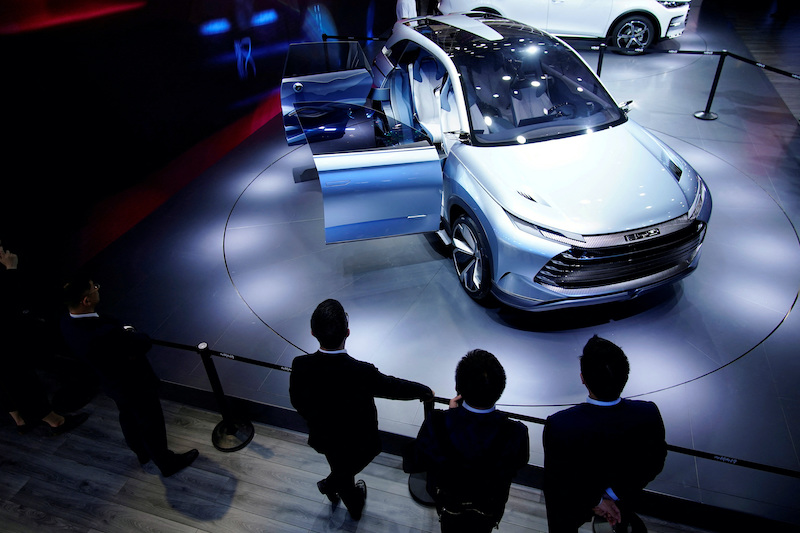Global economic uncertainty, caused partly by the threat of continuing high interest rates, may be cooling the transition to electric vehicles.
The scrapping of a partnership between General Motors and Honda on Wednesday, plus a warning from China’s top battery maker suggest the shift to EVs may be slower than climate regulators want and automakers initially envisaged.
Electric vehicle sales are still growing strongly, but demand is not keeping up with the expectations of carmakers and other companies that have invested billions of dollars in the EV space.
Expectations for persistently higher interest rates has led companies to alter plans as they eye 2024 warily.
ALSO SEE: Japan to Shake Up Battery Supply Lines Over China Fears
“EV demand next year could be lower than expectations,” Lee Chang-sil, chief financial officer at South Korean battery maker LG Energy Solution said on Wednesday, due to the global slowdown.
Also on Wednesday, Honda and General Motors announced they were ending a $5-billion plan to develop lower-cost EVs together just a year after announcing the effort. GM said it would focus near-term EV efforts on meeting demand rather than hitting specific volume targets.
“We’re taking immediate steps to enhance the profitability of our EV portfolio and adjust to slowing near-term growth,” GM CEO Mary Barra told analysts.
Investors have responded to the changed outlook. Over the last three months, the iShares Self-Driving EV and Tech exchange-traded fund has plunged more than 24%, far more than the 8.3% fall for the MSCI All-World Index, a proxy for global equities.
EV sales are growing, however. They topped 300,000 units in the United States for the first time in the third quarter, according to a Cox Automotive report. They rose 14.3% in September in the European Union and 22% in China, the world’s largest EV market.
High rates harder for carbuyers: Musk
Tesla CEO Elon Musk raised the alarm last week in explaining why he was slowing plans for a Mexico factory.
“I am worried about the high-interest rate environment that we’re in,” he said on Tesla’s earnings conference call. “As I just can’t emphasize this enough that the vast majority of people buying a car is about the monthly payment. If interest rates remain high or if they go even higher, it’s that much harder for people to buy the car.”
Other automakers have sounded similar notes of caution.
Germany’s Volkswagen last week cut its profit margin outlook for the year, blaming negative effects for raw material hedges at the end of the third quarter. Some of those materials are used in EV batteries.
Like many other industrial firms, carmakers hedge against commodity price swings, and with EV demand slowing, raw material prices have softened, including those used heavily in batteries.
Lithium, cobalt prices fall
Lithium prices have tumbled 67% so far this year based on spot lithium carbonate prices assessed by Fastmarkets. Prices of cobalt metal on the CME have slid 20% this year and more than halved since May last year.
US automaker Ford earlier this month said it would temporarily cut one of three shifts at the plant that builds its electric F-150 Lightning pickup truck, and in July slowed its EV ramp-up, shifting investment to commercial vehicles and hybrids.
Shares of Japan’s Nidec logged their biggest decline in a decade and a half on Tuesday, tumbling more than 10% on investor concerns over the motor manufacturer’s prospects in an increasingly tough Chinese market for EVs.
The Japanese motor manufacturer now expects a 15 billion yen ($100 million) full-year loss at its key e-axle business, rather than the profit it had previously seen. E-axle manufacture combines motors, gears and power-control electronics.
China’s CATL, the world’s largest battery maker for EVs, said last week that third-quarter profit rose 10.7%, its weakest quarter since the start of last year due to slowing demand and stiff competition.
The company’s market share in China tumbled in September to the lowest in more than a year, data showed, underscoring the challenges it faces from smaller rivals and weakening demand.
- Reuters with additional editing by Jim Pollard
ALSO SEE:
Honda and GM Drop Plan to Make Cheap Electric Vehicles
China’s EV Battery Giant CATL Profit Eases on Slower Demand
Ford Halts Work on $3.5bn CATL-Backed US Battery Plant
France Reworks Subsidy Criteria to Cut-Off Chinese EVs – Nikkei
























